人教版七年级下册Unit 2 What time do you go to school?Section B(1a~Self Check)课件(共41张PPT)
文档属性
| 名称 | 人教版七年级下册Unit 2 What time do you go to school?Section B(1a~Self Check)课件(共41张PPT) |
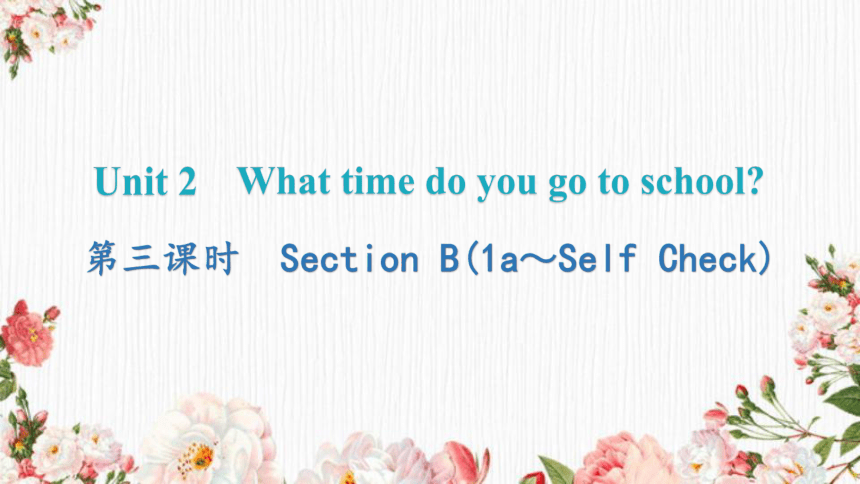
|
|
| 格式 | pptx | ||
| 文件大小 | 366.9KB | ||
| 资源类型 | 教案 | ||
| 版本资源 | 人教新目标(Go for it)版 | ||
| 科目 | 英语 | ||
| 更新时间 | 2023-02-10 00:00:00 | ||
图片预览

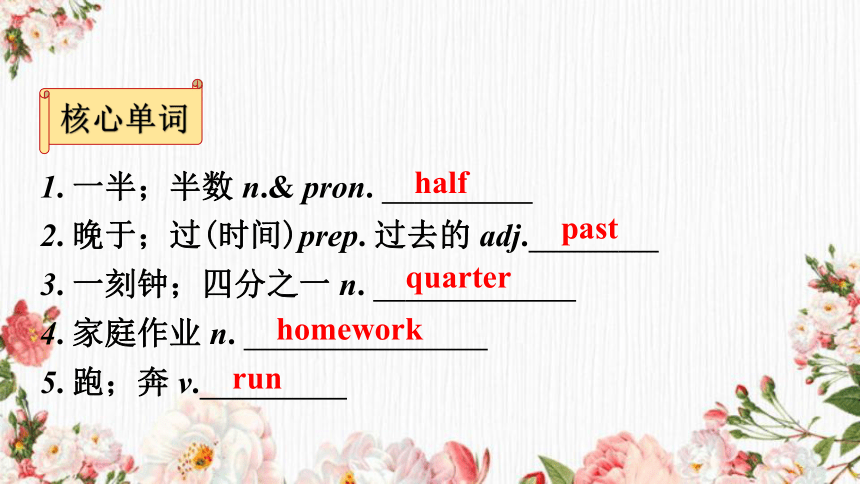
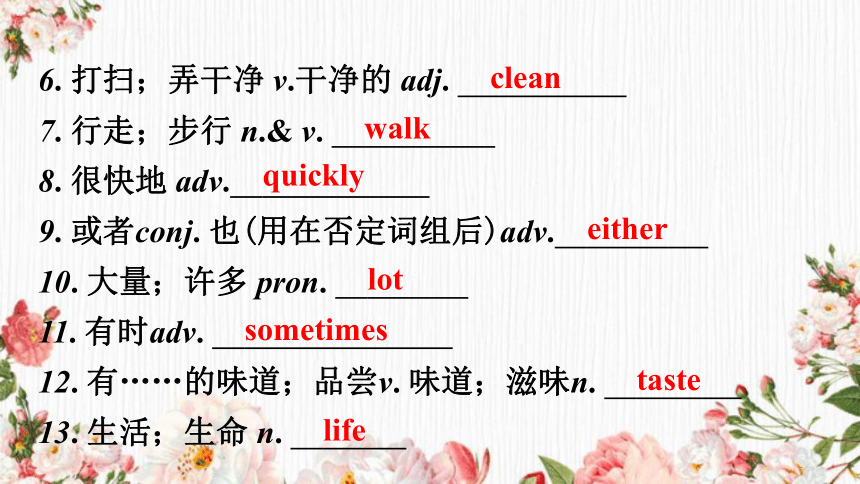
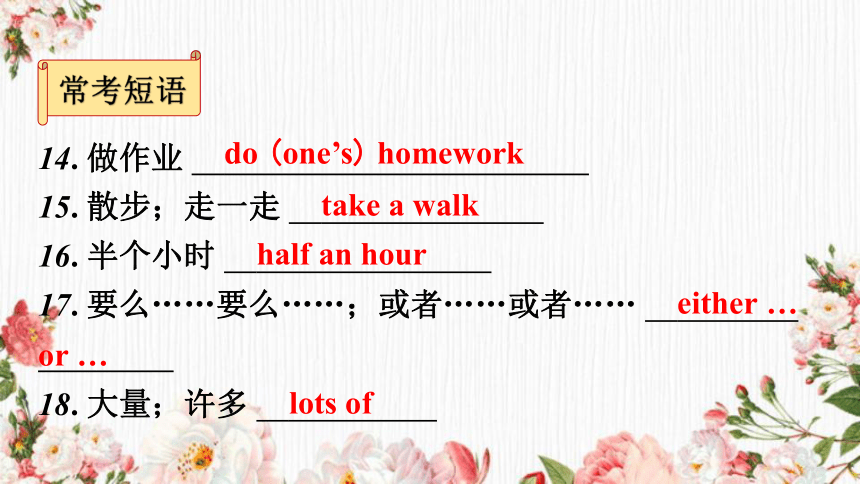

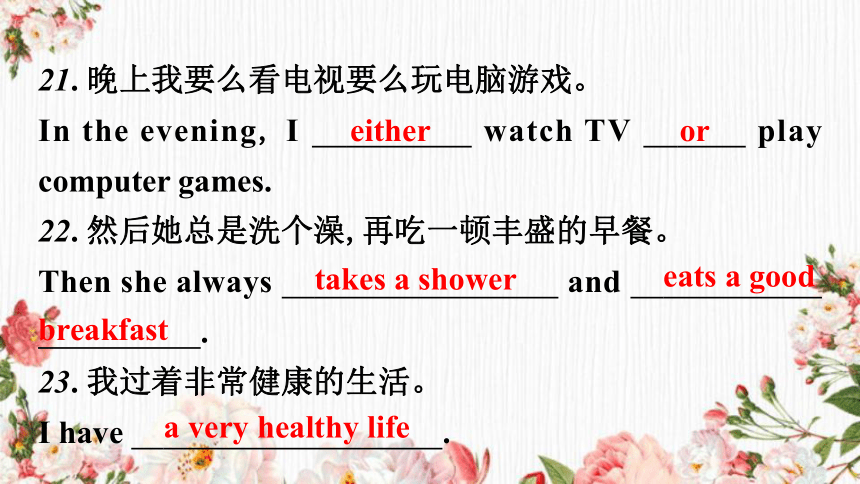
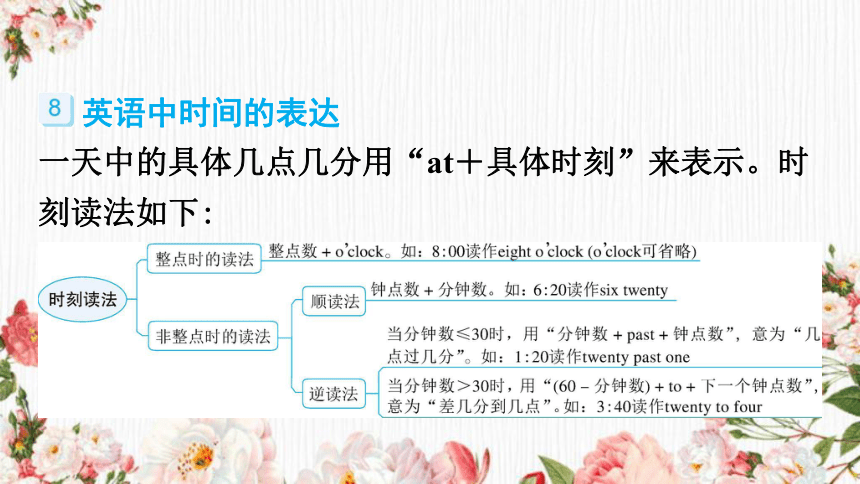
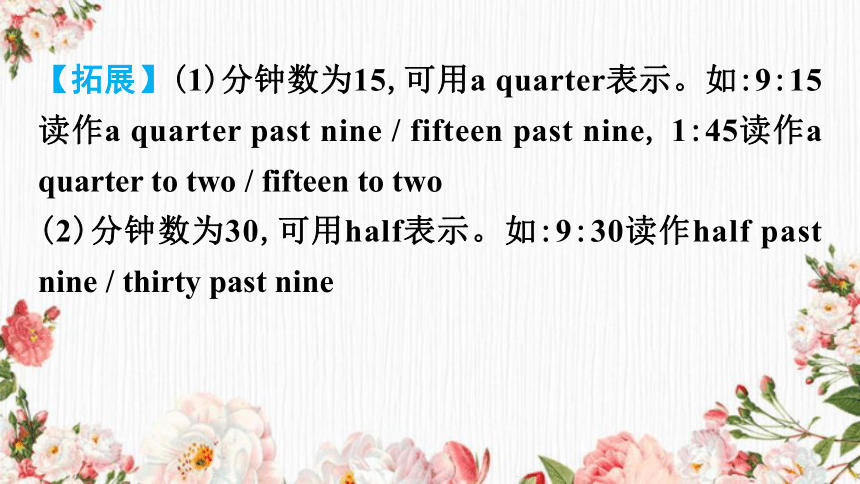
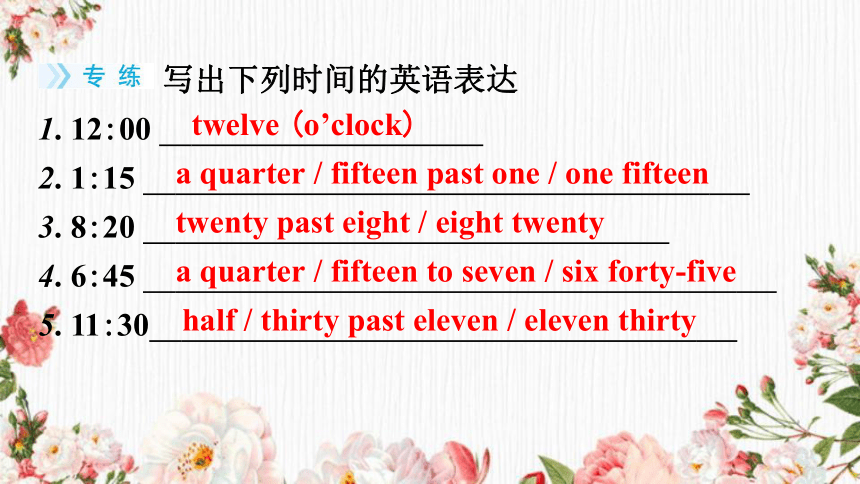
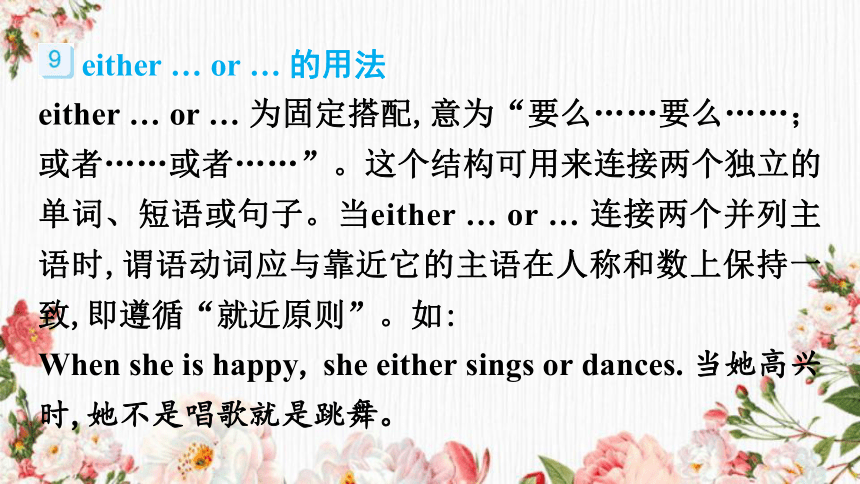
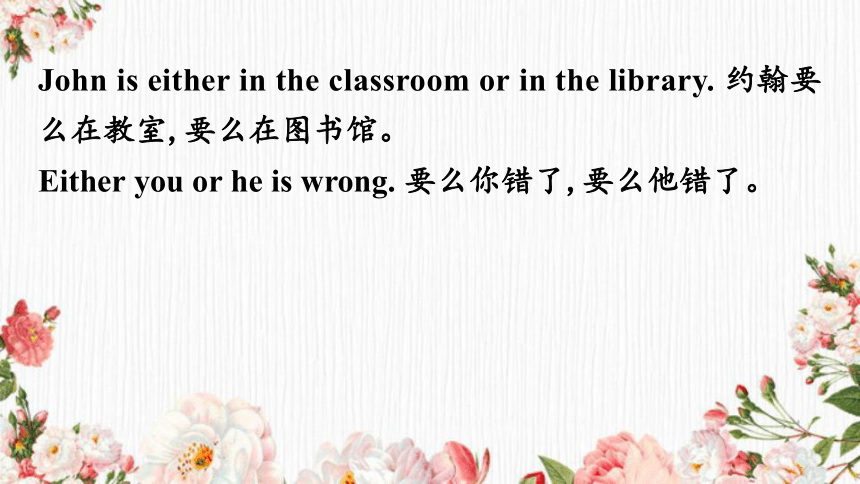
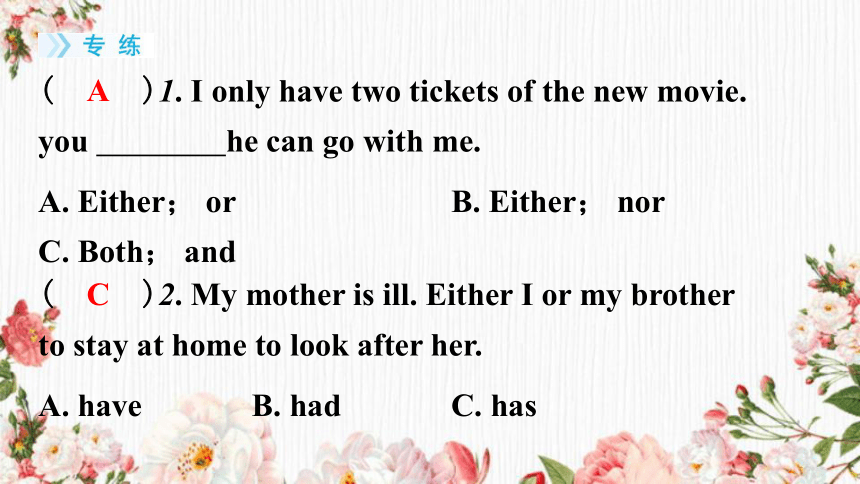
文档简介
(共41张PPT)
Unit 2 What time do you go to school
第三课时 Section B(1a~Self Check)
核心单词
1. 一半;半数 n.& pron. half
2. 晚于;过(时间)prep. 过去的 adj. past
3. 一刻钟;四分之一 n. quarter
4. 家庭作业 n. homework
5. 跑;奔 v. run
half
past
quarter
homework
run
6. 打扫;弄干净 v.干净的 adj. clean
7. 行走;步行 n.& v. walk
8. 很快地 adv. quickly
9. 或者conj. 也(用在否定词组后)adv. either
10. 大量;许多 pron. lot
11. 有时adv. sometimes
12. 有……的味道;品尝v. 味道;滋味n. taste
13. 生活;生命 n. life
clean
walk
quickly
either
lot
sometimes
taste
life
常考短语
14. 做作业 do (one’s) homework
15. 散步;走一走 take a walk
16. 半个小时 half an hour
17. 要么……要么……;或者……或者…… either … or …
18. 大量;许多 lots of
do (one’s) homework
take a walk
half an hour
either …
or …
lots of
典型句子
19. 午餐时,我通常吃汉堡包。
For lunch , I usually eat hamburgers.
20. 当我到家的时候,我总是先做我的家庭作业。
When I get home , I always do my homework first.
For lunch
get home
21. 晚上我要么看电视要么玩电脑游戏。
In the evening, I either watch TV or play computer games.
22. 然后她总是洗个澡,再吃一顿丰盛的早餐。
Then she always takes a shower and eats a good breakfast .
23. 我过着非常健康的生活。
I have a very healthy life .
either
or
takes a shower
eats a good
breakfast
a very healthy life
英语中时间的表达
一天中的具体几点几分用“at+具体时刻”来表示。时刻读法如下:
【拓展】(1)分钟数为15,可用a quarter表示。如:9:15读作a quarter past nine / fifteen past nine, 1:45读作a quarter to two / fifteen to two
(2)分钟数为30,可用half表示。如:9:30读作half past nine / thirty past nine
写出下列时间的英语表达
1. 12:00 twelve (o’clock)
2. 1:15 a quarter / fifteen past one / one fifteen
3. 8:20 twenty past eight / eight twenty
4. 6:45 a quarter / fifteen to seven / six forty-five
5. 11:30 half / thirty past eleven / eleven thirty
twelve (o’clock)
a quarter / fifteen past one / one fifteen
twenty past eight / eight twenty
a quarter / fifteen to seven / six forty-five
half / thirty past eleven / eleven thirty
either … or … 的用法
either … or … 为固定搭配,意为“要么……要么……;或者……或者……”。这个结构可用来连接两个独立的单词、短语或句子。当either … or … 连接两个并列主语时,谓语动词应与靠近它的主语在人称和数上保持一致,即遵循“就近原则”。如:
When she is happy, she either sings or dances. 当她高兴时,她不是唱歌就是跳舞。
John is either in the classroom or in the library. 约翰要么在教室,要么在图书馆。
Either you or he is wrong. 要么你错了,要么他错了。
( A )1. I only have two tickets of the new movie. you he can go with me.
A. Either; or B. Either; nor
C. Both; and
( C )2. My mother is ill. Either I or my brother to stay at home to look after her.
A. have B. had C. has
A
C
lots of, many与much的区别
比较项 含义及用法 举 例
lots of lots of=a lot of, 意为“大量;许多”;修饰可数名词复数或不可数名词 There are lots of books in the room. 房间里有许多书。
I had lots of rice for lunch today. 我今天中午吃了许多米饭。
比较项 含义及用法 举 例
many 意为“许多”,修饰可数名词复数 I have many healthy habits. 我有很多健康的习惯。
much 意为“许多”,修饰不可数名词 Don’t eat too much ice-cream. 不要吃太多冰激凌。
( B )1. Sorry,John. I can’t go with you. I have things to do.
A. much B. many C. a lot
( B )2. There is milk in the fridge. You can drink some.
A. many B. much C. lot of
B
B
sometimes, some times, sometime与some time 的区别
比较项 含义及用法 举 例
sometimes 频度副词,意为“有时”,表示动作发生的不经常性,多与一般现在时连用,它可位于句首、句中或句末,对它提问用how often She comes to visit us sometimes. 她有时来看望我们。
比较项 含义及用法 举 例
some times 名词短语,意为“几次;几倍”,其中time 是可数名词,对它提问用how many times Lucy has been to Beijing some times. 露西去过北京几次了。
比较项 含义及用法 举 例
sometime 副词,意为“某时”,表示某个不确切或不具体的时间,常用于过去时或将来时,对它提问用when Jack will leave for America sometime next week. 杰克将在下周某个时候动身去美国。
比较项 含义及用法 举 例
some time 名词短语,意为“一段时间”,其中time是不可数名词,常常修饰延续性动词,对它提问用 how long I need some time to do my homework. 我需要一些时间来做作业。
【巧记】分开是“一段”,相连为“某时”,分开s是“次;倍”,相连s是“有时”。
用sometimes, some times, sometime 或 some time 填空
1. I will visit him sometime next week.
2. My mother sometimes drives to work.
3. We go to that farm some times every week.
4. I go to New York and spend some time there.
sometime
sometimes
some times
some time
taste的用法
1. taste作动词时,意为“有……的味道;品尝”。如:
You can taste the cookies first. 你可以先品尝一下这些曲奇饼。
2.taste作名词时,意为“味道;滋味”。如:
I don’t like the taste of cheese. 我不喜欢奶酪的味道。
【拓展】常见的感官系动词有:taste(尝起来),look(看起来),sound(听起来),smell(闻起来),feel(觉得)。后常跟形容词作表语构成系表结构,其后也可跟介词like。如:
The fish tastes delicious. 鱼肉尝起来很美味。
That sounds like a good idea. 那听起来像是个好主意。
( C )1. —Let’s go to the movie this weekend.
—That interesting.
A. feels B. looks
C. sounds D. tastes
C
( B )2. Every time I see the strawberries, the sweet and beautiful color always make my mouth water.
A. voice B. taste
C. shape D. sound
B
( C )3. —Dinner is ready. Help yourself.
—Wow! It delicious. You are really good at cooking.
A. listens B. sounds
C. tastes D. sees
C
一、阅读教材P11-2b的课文,选出下列各题的最佳选项
( C )1. What does Tony always do first when he gets home
A. He always watches TV first.
B. He always plays computer games first.
C. He always does his homework first.
D. He always eats dinner first.
C
( A )2. Mary has for lunch.
A. lots of fruit and vegetables
B. ice-cream and hot dogs
C. hamburgers and juice
D. rice and eggs
A
( C )3. What can we know from the passage
A. Mary goes to bed late and gets up early.
B. Mary brushes her teeth before going to bed.
C. Both Tony and Mary have healthy habits and unhealthy ones.
D. Tony takes a walk in the evening.
C
二、再仔细阅读课文,回答下列问题
1. What time does Tony go to school
Tony / He goes to school at eight thirty. / At eight thirty.
2. What does Mary always do after getting up
Mary / She always takes a shower and eats a good breakfast.
3. Why does Mary always eat ice-cream after dinner
Because the ice-cream / it tastes good.
Tony / He goes to school at eight thirty. / At eight thirty.
Mary / She always takes a shower and eats a good breakfast.
Because the ice-cream / it tastes good.
三、阅读教材P11-2b的课文,完成短文填空
Tony and Mary are brother and sister, but they have 1 living habits.
Tony doesn’t get up 2 in the morning, so he doesn’t have much time for breakfast. He likes 3 hamburgers for lunch. After school, he sometimes plays basketball 4 half an hour. When he gets home from school, he always 5 his homework first. In the evening, he 6 watches TV or plays computer games. He brushes his teeth before going to bed 7 ten thirty.
Mary usually keeps early hours. She always 8 a shower and eats a good breakfast after getting up. For lunch, she eats 9 of fruit and vegetables. After lunch, she sometimes plays volleyball. She always eats ice-cream after dinner, though she knows it’s not good for 10 . In the evening, she does her homework and usually swims or takes a walk.
1. different 2. early 3. eating / to eat
4. for 5. does
6. either 7. at 8. takes
9. lots 10. her
different
early
eating / to eat
for
does
either
at
takes
lots
her
一、根据句意及中文或首字母提示,用单词的适当形式填空
1. Tom walks (步行) for thirty minutes every day.
2. Get up quickly , John. We don’t have much time.
3. She gets up late and she must run to school.
4. I think we need much clean (干净的) water.
walks
uickly
un
clean
5. Either (或者) your sister or you can go to the movie. I have only one ticket.
Either
二、根据要求完成句子,每空一词
6. My grandma usually has dinner at five in the afternoon. (就画线部分提问)
What time does your grandma usually have dinner
7. My uncle usually works late at night. (改为一般疑问句)
Does your uncle usually work late at night
What
time
Does
work
8. Peter plays soccer and basketball on Sunday. (改为否定句)
Peter doesn’t play soccer or basketball on Sunday.
9. Linda usually gets to school at seven fifty. (改为同义句)
Linda usually gets to school at ten to eight .
doesn’t
play
or
ten
to
eight
10. My cousin usually has much homework to do. (改为同义句)
My cousin usually has lots of homework to do.
lots
of
三、单项填空
( B )11. The old man takes a walk in the park.
A. sometime B. sometimes
C. some time
B
( A )12. Mary her room every day, so her room is very .
A. cleans; clean B. cleans; cleans
C. clean; cleans
( B )13. We have clubs in our school.
A. a lots of B. lots of C. lot of
A
B
( B )14. The salad good. I’d like to have more.
A. sounds B. tastes
C. looks D. smells
( A )15. Early to bed and early to get up our health.
A. is good for B. is bad for
C. is good in D. is bad in
B
A
请同学们完成《分层作业本》Unit 2第三课时的练习题。
Unit 2 What time do you go to school
第三课时 Section B(1a~Self Check)
核心单词
1. 一半;半数 n.& pron. half
2. 晚于;过(时间)prep. 过去的 adj. past
3. 一刻钟;四分之一 n. quarter
4. 家庭作业 n. homework
5. 跑;奔 v. run
half
past
quarter
homework
run
6. 打扫;弄干净 v.干净的 adj. clean
7. 行走;步行 n.& v. walk
8. 很快地 adv. quickly
9. 或者conj. 也(用在否定词组后)adv. either
10. 大量;许多 pron. lot
11. 有时adv. sometimes
12. 有……的味道;品尝v. 味道;滋味n. taste
13. 生活;生命 n. life
clean
walk
quickly
either
lot
sometimes
taste
life
常考短语
14. 做作业 do (one’s) homework
15. 散步;走一走 take a walk
16. 半个小时 half an hour
17. 要么……要么……;或者……或者…… either … or …
18. 大量;许多 lots of
do (one’s) homework
take a walk
half an hour
either …
or …
lots of
典型句子
19. 午餐时,我通常吃汉堡包。
For lunch , I usually eat hamburgers.
20. 当我到家的时候,我总是先做我的家庭作业。
When I get home , I always do my homework first.
For lunch
get home
21. 晚上我要么看电视要么玩电脑游戏。
In the evening, I either watch TV or play computer games.
22. 然后她总是洗个澡,再吃一顿丰盛的早餐。
Then she always takes a shower and eats a good breakfast .
23. 我过着非常健康的生活。
I have a very healthy life .
either
or
takes a shower
eats a good
breakfast
a very healthy life
英语中时间的表达
一天中的具体几点几分用“at+具体时刻”来表示。时刻读法如下:
【拓展】(1)分钟数为15,可用a quarter表示。如:9:15读作a quarter past nine / fifteen past nine, 1:45读作a quarter to two / fifteen to two
(2)分钟数为30,可用half表示。如:9:30读作half past nine / thirty past nine
写出下列时间的英语表达
1. 12:00 twelve (o’clock)
2. 1:15 a quarter / fifteen past one / one fifteen
3. 8:20 twenty past eight / eight twenty
4. 6:45 a quarter / fifteen to seven / six forty-five
5. 11:30 half / thirty past eleven / eleven thirty
twelve (o’clock)
a quarter / fifteen past one / one fifteen
twenty past eight / eight twenty
a quarter / fifteen to seven / six forty-five
half / thirty past eleven / eleven thirty
either … or … 的用法
either … or … 为固定搭配,意为“要么……要么……;或者……或者……”。这个结构可用来连接两个独立的单词、短语或句子。当either … or … 连接两个并列主语时,谓语动词应与靠近它的主语在人称和数上保持一致,即遵循“就近原则”。如:
When she is happy, she either sings or dances. 当她高兴时,她不是唱歌就是跳舞。
John is either in the classroom or in the library. 约翰要么在教室,要么在图书馆。
Either you or he is wrong. 要么你错了,要么他错了。
( A )1. I only have two tickets of the new movie. you he can go with me.
A. Either; or B. Either; nor
C. Both; and
( C )2. My mother is ill. Either I or my brother to stay at home to look after her.
A. have B. had C. has
A
C
lots of, many与much的区别
比较项 含义及用法 举 例
lots of lots of=a lot of, 意为“大量;许多”;修饰可数名词复数或不可数名词 There are lots of books in the room. 房间里有许多书。
I had lots of rice for lunch today. 我今天中午吃了许多米饭。
比较项 含义及用法 举 例
many 意为“许多”,修饰可数名词复数 I have many healthy habits. 我有很多健康的习惯。
much 意为“许多”,修饰不可数名词 Don’t eat too much ice-cream. 不要吃太多冰激凌。
( B )1. Sorry,John. I can’t go with you. I have things to do.
A. much B. many C. a lot
( B )2. There is milk in the fridge. You can drink some.
A. many B. much C. lot of
B
B
sometimes, some times, sometime与some time 的区别
比较项 含义及用法 举 例
sometimes 频度副词,意为“有时”,表示动作发生的不经常性,多与一般现在时连用,它可位于句首、句中或句末,对它提问用how often She comes to visit us sometimes. 她有时来看望我们。
比较项 含义及用法 举 例
some times 名词短语,意为“几次;几倍”,其中time 是可数名词,对它提问用how many times Lucy has been to Beijing some times. 露西去过北京几次了。
比较项 含义及用法 举 例
sometime 副词,意为“某时”,表示某个不确切或不具体的时间,常用于过去时或将来时,对它提问用when Jack will leave for America sometime next week. 杰克将在下周某个时候动身去美国。
比较项 含义及用法 举 例
some time 名词短语,意为“一段时间”,其中time是不可数名词,常常修饰延续性动词,对它提问用 how long I need some time to do my homework. 我需要一些时间来做作业。
【巧记】分开是“一段”,相连为“某时”,分开s是“次;倍”,相连s是“有时”。
用sometimes, some times, sometime 或 some time 填空
1. I will visit him sometime next week.
2. My mother sometimes drives to work.
3. We go to that farm some times every week.
4. I go to New York and spend some time there.
sometime
sometimes
some times
some time
taste的用法
1. taste作动词时,意为“有……的味道;品尝”。如:
You can taste the cookies first. 你可以先品尝一下这些曲奇饼。
2.taste作名词时,意为“味道;滋味”。如:
I don’t like the taste of cheese. 我不喜欢奶酪的味道。
【拓展】常见的感官系动词有:taste(尝起来),look(看起来),sound(听起来),smell(闻起来),feel(觉得)。后常跟形容词作表语构成系表结构,其后也可跟介词like。如:
The fish tastes delicious. 鱼肉尝起来很美味。
That sounds like a good idea. 那听起来像是个好主意。
( C )1. —Let’s go to the movie this weekend.
—That interesting.
A. feels B. looks
C. sounds D. tastes
C
( B )2. Every time I see the strawberries, the sweet and beautiful color always make my mouth water.
A. voice B. taste
C. shape D. sound
B
( C )3. —Dinner is ready. Help yourself.
—Wow! It delicious. You are really good at cooking.
A. listens B. sounds
C. tastes D. sees
C
一、阅读教材P11-2b的课文,选出下列各题的最佳选项
( C )1. What does Tony always do first when he gets home
A. He always watches TV first.
B. He always plays computer games first.
C. He always does his homework first.
D. He always eats dinner first.
C
( A )2. Mary has for lunch.
A. lots of fruit and vegetables
B. ice-cream and hot dogs
C. hamburgers and juice
D. rice and eggs
A
( C )3. What can we know from the passage
A. Mary goes to bed late and gets up early.
B. Mary brushes her teeth before going to bed.
C. Both Tony and Mary have healthy habits and unhealthy ones.
D. Tony takes a walk in the evening.
C
二、再仔细阅读课文,回答下列问题
1. What time does Tony go to school
Tony / He goes to school at eight thirty. / At eight thirty.
2. What does Mary always do after getting up
Mary / She always takes a shower and eats a good breakfast.
3. Why does Mary always eat ice-cream after dinner
Because the ice-cream / it tastes good.
Tony / He goes to school at eight thirty. / At eight thirty.
Mary / She always takes a shower and eats a good breakfast.
Because the ice-cream / it tastes good.
三、阅读教材P11-2b的课文,完成短文填空
Tony and Mary are brother and sister, but they have 1 living habits.
Tony doesn’t get up 2 in the morning, so he doesn’t have much time for breakfast. He likes 3 hamburgers for lunch. After school, he sometimes plays basketball 4 half an hour. When he gets home from school, he always 5 his homework first. In the evening, he 6 watches TV or plays computer games. He brushes his teeth before going to bed 7 ten thirty.
Mary usually keeps early hours. She always 8 a shower and eats a good breakfast after getting up. For lunch, she eats 9 of fruit and vegetables. After lunch, she sometimes plays volleyball. She always eats ice-cream after dinner, though she knows it’s not good for 10 . In the evening, she does her homework and usually swims or takes a walk.
1. different 2. early 3. eating / to eat
4. for 5. does
6. either 7. at 8. takes
9. lots 10. her
different
early
eating / to eat
for
does
either
at
takes
lots
her
一、根据句意及中文或首字母提示,用单词的适当形式填空
1. Tom walks (步行) for thirty minutes every day.
2. Get up quickly , John. We don’t have much time.
3. She gets up late and she must run to school.
4. I think we need much clean (干净的) water.
walks
uickly
un
clean
5. Either (或者) your sister or you can go to the movie. I have only one ticket.
Either
二、根据要求完成句子,每空一词
6. My grandma usually has dinner at five in the afternoon. (就画线部分提问)
What time does your grandma usually have dinner
7. My uncle usually works late at night. (改为一般疑问句)
Does your uncle usually work late at night
What
time
Does
work
8. Peter plays soccer and basketball on Sunday. (改为否定句)
Peter doesn’t play soccer or basketball on Sunday.
9. Linda usually gets to school at seven fifty. (改为同义句)
Linda usually gets to school at ten to eight .
doesn’t
play
or
ten
to
eight
10. My cousin usually has much homework to do. (改为同义句)
My cousin usually has lots of homework to do.
lots
of
三、单项填空
( B )11. The old man takes a walk in the park.
A. sometime B. sometimes
C. some time
B
( A )12. Mary her room every day, so her room is very .
A. cleans; clean B. cleans; cleans
C. clean; cleans
( B )13. We have clubs in our school.
A. a lots of B. lots of C. lot of
A
B
( B )14. The salad good. I’d like to have more.
A. sounds B. tastes
C. looks D. smells
( A )15. Early to bed and early to get up our health.
A. is good for B. is bad for
C. is good in D. is bad in
B
A
请同学们完成《分层作业本》Unit 2第三课时的练习题。
同课章节目录
- Unit 1 Can you play the guitar?
- Section A
- Section B
- Unit 2 What time do you go to school?
- Section A
- Section B
- Unit 3 How do you get to school?
- Section A
- Section B
- Unit 4 Don't eat in class.
- Section A
- Section B
- Unit 5 Why do you like pandas?
- Section A
- Section B
- Unit 6 I'm watching TV.
- Section A
- Section B
- Review of Units 1-6
- Unit 7 It's raining!
- Section A
- Section B
- Unit 8 Is there a post office near here?
- Section A
- Section B
- Unit 9 What does he look like?
- Section A
- Section B
- Unit 10 I'd like some noodles.
- Section A
- Section B
- Unit 11 How was your school trip?
- Section A
- Section B
- Unit 12 What did you do last weekend?
- Section A
- Section B
